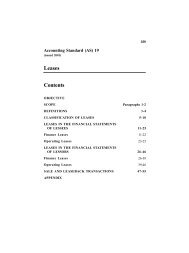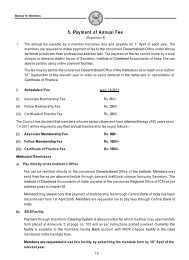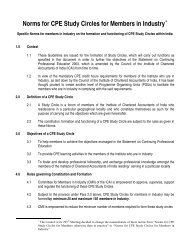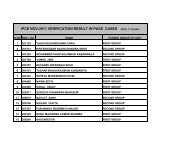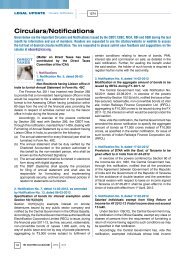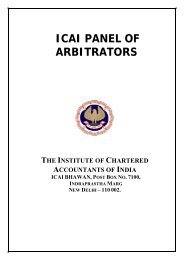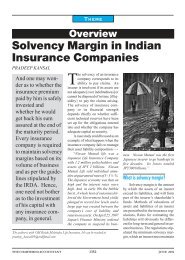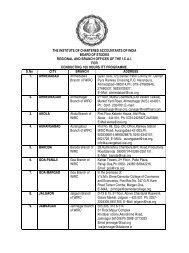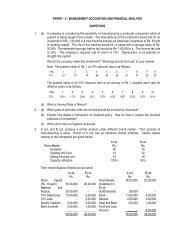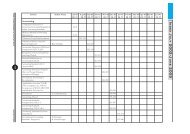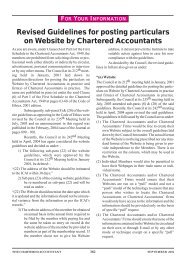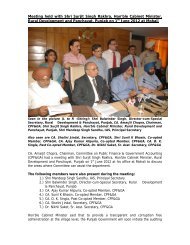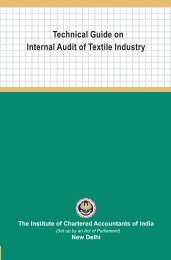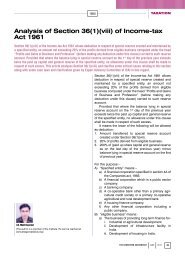The Chartered Accountant
The Chartered Accountant
The Chartered Accountant
Create successful ePaper yourself
Turn your PDF publications into a flip-book with our unique Google optimized e-Paper software.
GLOBAL PERSPECTIVE<br />
freeze. Subprime lenders, who have very little over<br />
sight compared with traditional banks, had strong financial<br />
motivations to increase the volume of loan<br />
originations, since they made money on each loan<br />
they wrote. Because they sold the loans to investment<br />
banks, which did not require the same level of underwriting<br />
standards as did the GSEs, mortgage brokers<br />
had very little motivation to assure the quality<br />
of the loans they were making. In addition, the US<br />
Congress and politicians from both dominant political<br />
parties pressured Fannie Mae and Freddie Mac<br />
to increase home ownership by encouraging lending<br />
to poorer consumers by relaxing lending norms.<br />
Corporate governance at many of the failed institutions<br />
is also suspect for compensation plans that may<br />
have encouraged excessive risk taking by executives.<br />
In particular, some compensation plans discouraged<br />
retail banks and subprime lenders from making timely<br />
provisions for the bad loans they were writing. While<br />
such provisions may have depressed the stock prices<br />
of those firms and hurt the compensation of their executives,<br />
this action would have sent appropriate and<br />
opportune signals to the markets that subprime loans<br />
were not performing well. Sooner discovery of this<br />
problem may have isolated the companies that had<br />
exposure to subprime loans and prevented the crisis<br />
from spreading. Auditors and audit committees for<br />
these financial institutions also bear some responsibility<br />
for not forcing companies to make provisions for<br />
bad loans and to write down impaired assets in a timely<br />
manner. While the FAS 157 rule that mandated markto-market<br />
accounting methods forced a reflection of<br />
the sharp decrease in MBS values, it is unclear that<br />
MBS and CDS markets are functioning well enough<br />
to be good sources of information on security values.<br />
Hence, the mark-to-market rule should be re-thought<br />
for environments where the market does not function<br />
effectively and lacks proper infrastructure.<br />
Credit rating agencies also are accountable in part for<br />
the MBS market debacle. SPEs paid the ratings agencies<br />
for their securities to be rated. A system where<br />
the firm being rated pays for its ratings is rife with<br />
conflicts of interest. In particular, when firms play<br />
one ratings agency against another (also known as<br />
opinion shopping) to get the highest ratings that money<br />
can buy, ratings become meaningless. We clearly<br />
need more regulation of how ratings agencies do<br />
business.<br />
It also appears that credit ratings agencies and financial<br />
institutions used flawed models to model risk.<br />
<strong>The</strong>y seem to have grossly underestimated the corre-<br />
lation in default events. Large numbers of homeowners<br />
tend to default at the same time as each other if<br />
home prices decline and interest rates move up simultaneously.<br />
This will then lead to financial institutions<br />
with MBS on their books defaulting at the same time.<br />
This correlation in default events seems to have been<br />
underestimated by most players in the market. Thus<br />
insurance companies were covering risk that they did<br />
not fully comprehend. To make matters worse, investment<br />
banks and insurance companies were highly levered.<br />
<strong>The</strong> impact of their risk exposure to the real<br />
estate market was amplified by their astronomical leverage<br />
levels.<br />
Lax oversight of mortgage brokers and mortgage loan<br />
originators allowed consumers with very poor credit<br />
histories to borrow large sums they possibly could not<br />
afford. <strong>The</strong> list of exotic or predatory loans widely<br />
available to home buyers reads like a litany of bad<br />
ideas. Loans with teaser rates (low introductory rates<br />
that step up rather rapidly), and “no documentation”<br />
loans (also known as “liar loans”) where the potential<br />
home buyer’s financial position was taken on faith,<br />
and interest only loans (where borrower payments do<br />
not pay down principle) should not have been allowed<br />
in the first place.<br />
Implications for India<br />
India is prone to rapid increases in real estate prices,<br />
and the use of credit to finance real estate purchases<br />
has become very common. In fact, property prices<br />
have appreciated much more rapidly during the last<br />
ten years in urban India than they have in the United<br />
States. This price increase has been fueled by NRI investments,<br />
IT professionals buying flats in large numbers,<br />
and commercial property buildup to support IT,<br />
IT-Enabled Services, and export businesses. With the<br />
world economy headed into a recession, the factors<br />
that fueled the real estate boom in India may no longer<br />
be able to support real estate prices in India. To<br />
make matters worse, loans to asset values have been<br />
steadily climbing in India as well. If salaries in the Indian<br />
IT sector decline in concert with a decline in the<br />
United States and European economies, many professionals<br />
who are first-time homeowners may default on<br />
their home mortgages in India. Private-sector banks<br />
that have taken the lead in financing home purchases<br />
may be hit the hardest. In India, however, problems in<br />
the real estate and banking sector are likely to be contained<br />
and are unlikely to impact insurance companies<br />
and investment banks, because India lacks a strong<br />
secondary mortgage market. Banks in India are also<br />
unlikely to witness liabilities from off-balance sheet<br />
SPEs.<br />
THE CHARTERED ACCOUNTANT 1013 DECEMBER 2008



